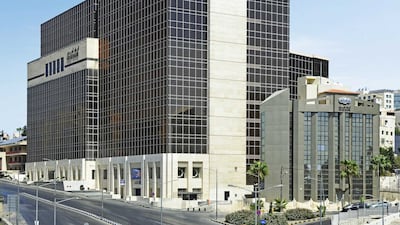Arab Bank, Jordan's biggest lender, reported a 30 per cent rise in its first-quarter profit, boosted by a surge in core banking revenue, despite tougher conditions for the global financial sector.
Net income after tax rose to $216 million in the three months to the end of March, up from $166 million recorded for the same period last year, the lender said in a statement on Sunday.
"Arab Bank continued to deliver sustainable growth rates during 2023 despite the continued elevated inflation and interest rates," said Randa Sadik, the lender's chief executive.
Lenders in the Middle East, where many central banks peg their currency to the US dollar, are benefiting from rising interest rates as their economies recover and inflation in the region remains relatively low.
Jordan's economy is expected to grow 2.7 per cent this year and an inflation rate of 3.8 per cent, the International Monetary Fund said.
The banking sector dominates Jordan’s financial system and its strength is essential to support macroeconomic stability and the peg to the US dollar, according to a March report by the International Monetary Fund on the country's financial system.
Jordan's banking sector appears "broadly resilient", although there are pockets of vulnerability. The banks' exposures to the highly indebted sovereign are large, making their concentration risk substantial, the fund said at the time.
Arab Bank, which has more than 600 branches across five continents, said its net operating profit rose by 50 per cent on growth of core banking revenue, cost control and despite increased economic uncertainty globally.
The bank's loans grew by 3 per cent to $35.4 billion, while its deposits rose 4 per cent to $47.7 billion, excluding the effect of several currencies' devaluation against the US dollar, it said.
The group's liquidity and asset quality "remains solid", with loan-to-deposit ratio reaching 74.1 per cent at the end of March. Credit provisions held against non-performing loans continued to exceed 100 per cent during the same period, Ms Sadik said.
The group maintained a strong capital base with a total equity of $10.4 billion that is mainly composed of common equity with a capital adequacy ratio — a measure of financial stability of a financial institution — of 16.8 per cent, according to the statement.
The lender's first quarter performance was "strong" and reflects its "resilience and ability to deliver sustainable growth", said chairman Sabih Masri.
Arab Bank is also continuing its digital transformation as it expands on services and solutions in line with the latest trends and developments, Ms Sadik said.
The bank is also offering initiatives for FinTechs for ideas to develop into products and services, she added.
Jordan, which has limited natural resources, imports more than 90 per cent of its energy needs and relies on foreign aid and grants to finance its fiscal and current account needs. The kingdom is trying to overhaul its economy and cut state subsidies at a time of high public debt and unemployment.
In November, the IMF and Jordan reached a preliminary agreement to increase total assistance to the kingdom to about $2 billion until 2024.
The deal is in addition to about $469 million disbursed under Jordan's IMF general special drawing right allocation in August 2021.


